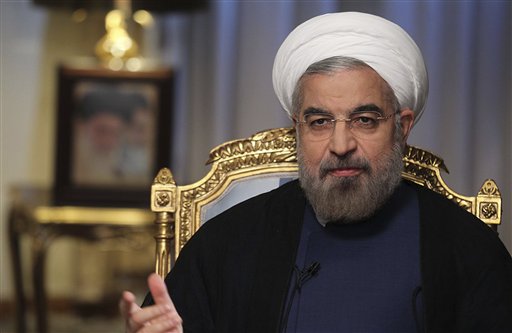WASHINGTON — Iranian President Hasan Rouhani says his people should be free to think, speak and seek information on the Internet, subject to “the protection of our national identity.”
In an interview with NBC News in Tehran, Rouhani said that a “commission for citizens’ rights” will be established “in the near future.” He said the viewpoint of the government on censorship issues should be based “on our morals.”
“We want the people in their private life to be completely free. In today’s world, having access to information and the right of free dialogue and the right to think freely is the right of all people, including the people of Iran,” Rouhani said, according to an NBC translation of the interview. A portion of the interview was broadcast Thursday on the “Today” show.
In the wide-ranging question-and-answer session, Rouhani said that Iran has “never pursued or sought a nuclear bomb and we are not going to do so.”
He side-stepped a question about whether the Holocaust was real. And he said that his authority is genuine and lasting, even though Iranian Supreme Leader Ayatollah Ali Khamenei is known to control all matters of state, including nuclear.
Asked by network correspondent Ann Curry about statements that predecessor Mahmoud Ahmadinejad made questioning the Holocaust, Rouhani said only, “I’m not a historian. I’m a politician. What is important for us is that the countries of the region and the people grow closer to each other and that they are able to prevent aggression and injustice.”
Asked about criticism from Israeli Prime Minister Benjamin Netanyahu of Iran’s policies and plans, Rouhani said he didn’t understand how an “occupier” nation could be in a position to lecture another country. He called Israel a nation that “does injustice to the people of the region and has brought instability to the region with its war-mongering policies.” Rouhani said Israel “shouldn’t allow itself to give speeches about a democratically and freely elected government.”
“What we wish for in this region is rule by the will of the people,” he said. “We believe in the ballot box. We do not seek war with any country. We seek peace and friendship among the nations of the region.”
With respect to the Internet and censorship, Rouhani said, “The viewpoint of the government is that people must have full access to all information worldwide. Our opinion on this should be based on the protection of our national identity and on our morals.”
Rouhani spoke to the American television network just days before he is to make his first appearance as president on the world stage when he attends the United Nations General Assembly in New York. U.S. officials will be watching next week’s visit closely for signs that Rouhani will warm relations with the West and take a more moderate line in the next negotiations on Iran’s disputed nuclear program.
“We have never pursued or sought a nuclear bomb and we are not going to do so,” Rouhani said. “We have time and again said that under no circumstances would we seek any weapons of mass destruction, including nuclear weapons, nor will we ever.”
It was a claim Iran has made before, that its nuclear activities are purely peaceful. However, the U.S. and its allies suspect Iran is trying to develop a nuclear weapon, a feat some experts say the country might be able to accomplish as early as next year.
Rouhani also addressed a question that many in the U.S. have been asking: Does he really have the power to make major decisions and concessions on the nuclear issue?
“In its nuclear program, this government enters with full power and has complete authority,” he said. “We have sufficient political latitude to solve this problem.”
Rouhani is considered a relative moderate in Iran’s hard-line clerical regime. He campaigned on a promise to seek relief from punishing U.S. and Western sanctions that have slashed Iran’s vital oil exports by more than half in the past two years, sent inflation soaring and severely undercut the value of its currency.
Turning to the Syria, Rouhani addressed U.S. allegations that the Iranian-allied regime was behind a chemical weapons attack near Damascus last month. He said his country seeks peace and stability and the elimination of weapons of mass destruction in the entire region.
Asked whether President Barack Obama had looked weak by backing off a military strike on the Syrian regime, Rouhani responded: “We consider war a weakness. Any government that decides on war, we consider a weakness. And any government that decides on peace, we look on it with respect for peace.”
Rouhani also said he received a “positive and constructive” letter from Obama congratulating him on his election in June. In it, he said Obama raised some issues the U.S. president was concerned about and that he had responded to the points Obama raised.
“From my point of view, the tone of the letter was positive and constructive,” Rouhani said. “It could be subtle and tiny steps for a very important future.”
White House spokesman Jay Carney said Wednesday there were no current plans for Obama to meet Rouhani at the U.N. General Assembly.
Send questions/comments to the editors.



Success. Please wait for the page to reload. If the page does not reload within 5 seconds, please refresh the page.
Enter your email and password to access comments.
Hi, to comment on stories you must . This profile is in addition to your subscription and website login.
Already have a commenting profile? .
Invalid username/password.
Please check your email to confirm and complete your registration.
Only subscribers are eligible to post comments. Please subscribe or login first for digital access. Here’s why.
Use the form below to reset your password. When you've submitted your account email, we will send an email with a reset code.